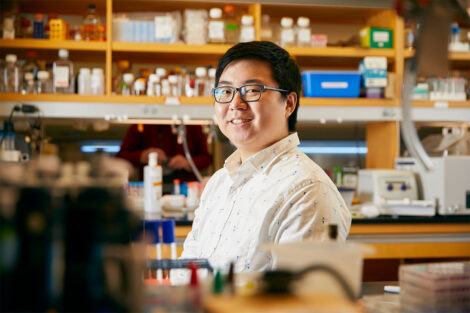May 12, 2022 – Over the past few years of his PhD research, Harim Won has been laying the groundwork to develop a new type of antibiotic to treat tuberculosis (TB), addressing the long-standing problems of lengthy treatments and antibiotic resistance. Won is using a new approach to turn a normal protein system in the bacterial cell against itself.
Won, who works in the lab of Eric Rubin, adjunct professor of immunology and infectious diseases at Harvard T.H. Chan School of Public Health, is completing a degree in biological sciences in public health.
In January, Won was named a 2022 Harvard Horizons Scholar by the Graduate School of Arts and Sciences. Selected for his promising research, he had the opportunity, along with the seven other Horizons Scholars, to share his work at a mid-April public symposium.
Because TB treatment ranges from six months for typical cases up to two years for multidrug-resistant cases, health care workers travel to patients’ homes each day to ensure that antibiotics are taken consistently. The COVID-19 pandemic disrupted this process, particularly in low- and middle-income countries with limited resources. As a result, after years of steadily declining deaths due to TB, the trend has reversed.
The conventional strategy of finding more effective antibiotics has shown limited success over the past few decades. “If you think of a bacterial cell like an electric pencil sharpener, one of the bacterial proteins could be likened to the sharpener’s blades,” Won explained. “If you took Silly Putty and jammed it right in the blades, it would stop that component from working and the sharpener wouldn’t work, like how the bacterial cell would die if an antibiotic molecule jammed up the protein. Instead, what if we could somehow get the pencil sharpener to chew up its own wiring?”
Since a traditional antibiotic molecule fits into one specific site of the protein, a single mutation there can prevent binding and lead to drug resistance.
Won has turned to other fields for inspiration, taking an approach called targeted protein degradation that has been used to create cancer drugs. Adapting the strategy for bacteria, instead of one antibiotic molecule sticking to one bacterial protein, the method uses a two-headed molecule that binds to both a target protein and a protein system called a protease. “We can think of a protease like a garbage disposal in the cell. Its jobs include chewing up old proteins or ones that are messed up for one reason or another. With targeted protein degradation, you’re taking a normal system in cells and redirecting it to destroy proteins that are causing disease,” he said.
Compared to a traditional antibiotic, the two-headed molecule can theoretically attach anywhere on the target protein and protease, not just at one site—giving researchers more options for designing the drug and combatting antibiotic resistance.
In proof-of-concept experiments, Won used genetic engineering techniques to modify potential target proteins and the protease. He added tags that brought the two parts close to each other inside the cell, mimicking the role of the two-headed molecule. He found that the protease could indeed degrade the target proteins and affect the bacteria, either by reducing bacterial growth or making the bacteria more sensitive to an existing antibiotic.
Won performed the experiments in a petri dish using a bacterial strain that models TB, so the next steps include testing using TB bacteria and animal models of the disease. Once the experiments identify the best target proteins, the lab will collaborate with chemists to find a molecule that binds to the proteins and the protease.
“Our approach to developing new antibiotics is largely to try to figure out ways to gum up the works in the organism that is causing an infection,” said Rubin. “Harry is taking a very different way, turning an essential bacterial system against itself. It opens up a completely new path toward developing anti-infective medications.”
More broadly, Won views antibiotic development as a matter of justice. “Exposure is not equal in infectious diseases, and accessibility of treatments is also not equitable. The best way I can think of to make our world healthier is being involved in the process of making new medicines that help people,” he said.
Watch a video clip from Harim Won’s Harvard Horizons Symposium presentation
Photo: Kent Dayton
